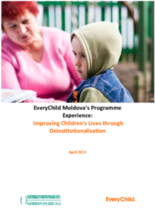This Program Review documents the evolution of EveryChild/Partnerships for Every Child Moldova- since 1994, presenting the development of interventions to improve the lives of children through deinstitutionalization and identifying best practices that are relevant, useful, and replicable to other initiatives and organizations around the world. It documents the programmatic approach to deinstitutionalization as a model of good practice, and makes recommendations for stakeholders in Moldova toward achieving the closure of all institutions for children in the country by building on the country’s work to date, including the practices modeled by EveryChild. This report is intended to be a resources for program managers, project workers, authors initiating or participating in the design and implementation of programs and projects aiming to improve children’s lives through deinstitutionalization.
Moldova relied heavily on the institutionalization of children as a protection measure. Poverty and limited family support services at the community level led to placement of thousands of children from poor families and of children with disabilities in residential care. In 1995, the number of children under the age of 18 in residential institutions was 17,000 (1.2 %) out of the total population of 1,458,454 children between ages 0-18. By 2012, the number of children in residential institutions had dropped to 4,515 (0.6%) out of the total population of 784,000 children between ages 0-18 (Moldova’s demographic environment is defined by a declining population, proportion of children and a high rate of migration). EveryChild has successfully worked with multiple actors to impact different levels of reform and sustain best practices of deinstitutionalization.
The report identifies key factors that made interventions effective, including innovative direct services, partnership with government, building capacity, lobbying and policy advocacy, collaborating, building evidence base, raising public awareness, and giving voices to children and their families. It also makes recommendations to address remaining challenges, including gaps in services, particularly in relation to foster care and the need to extend deinstitutionalization beyond children in the general boarding schools to children residing in baby homes, auxiliary schools and institutions for children with disabilities or health issues.
©EveryChild, Partnerships for Every Child Moldova

